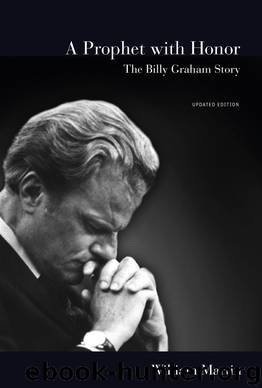A Prophet with Honor by William C. Martin

Author:William C. Martin
Language: eng
Format: epub
Publisher: Zondervan
Published: 2018-01-31T05:00:00+00:00
Part 5
Keeping the Faith (1974–1990)
27
Lausanne
In the gospel accounts of Jesus’ final meeting with his eleven faithful apostles a few moments before he ascended into heaven, he gave them what came to be known as the Great Commission: “Go forth to every part of the world, and proclaim the Good News to the whole creation. Those who believe it and receive baptism will find salvation; those who do not believe it will be condemned.” In August 1974 Time magazine noted that “millions of Christians still take that commission of Christ literally, still believe that one of their foremost tasks is to preach the Gospel to the unbaptized.” Taken alone, that was a commonplace observation, but Time saw something uncommon afoot in the Christian world. “Last week,” it announced, “in the lakeshore resort of Lausanne, Switzerland, that belief found a formidable forum, possibly the widest-ranging meeting of Christians ever held. Brought together largely through the efforts of the Rev. Billy Graham, some 2,400 Protestant Evangelical leaders from 150 countries ended a ten-day International Congress on World Evangelization that served notice of the vigor of conservative, resolutely biblical, fervently mission-minded Christianity.” That notice and the congress that had served it, Time suggested, “constituted a considerable challenge to the prevailing philosophy in the World Council of Churches, headquartered some 30 miles down Lake Leman in Geneva.” The WCC, the magazine noted, had all but abandoned any attempt “to disturb the honest faith” of adherents to non-Christian religions and had redefined its mission as “more of a campaign to achieve a sort of secular salvation, a human liberation in the political and social sense.” The Lausanne Congress had arisen, at least in part, as a direct response to that departure from the evangelistic motive that had impelled John Mott to convene the meetings and form the organizations that eventually led to the founding of the WCC in 1948. Now, Time ventured, “the Evangelicals at Lausanne [had] laid the groundwork for a post-congress ‘fellowship’ that could eventually develop into a rival international body.” Seventeen years later, no Evangelical world council had been formed, but the spirit of Lausanne was still vibrantly alive and the WCC’s good ship Oikumene has unquestionably felt the waves generated when Billy Graham’s band of Evangelicals dropped the Rock of Ages in their ocean.
Evangelism had steadily lost ground throughout the century in WCC-affiliated churches, but the turmoil of the 1960s had accelerated that process. In the West, liberal theologians and seminaries had flirted with and, in some cases, openly embraced views so unorthodox that it became fashionable to contend that one was being most “honest to God” when proclaiming God’s death, a stance that obviously undermined any plausible theological rationale for preaching a gospel of otherworldly salvation. In America this progressive diminution of confidence in the basic historic claims of Christianity combined with increased attention to civil rights, poverty, and Vietnam to detract even further from interest in evangelism and traditional missions. In the United Presbyterian Church, for example, the number of missionaries declined from 1,300 in 1958 to only 580 in 1973.
Download
This site does not store any files on its server. We only index and link to content provided by other sites. Please contact the content providers to delete copyright contents if any and email us, we'll remove relevant links or contents immediately.
| Africa | Americas |
| Arctic & Antarctica | Asia |
| Australia & Oceania | Europe |
| Middle East | Russia |
| United States | World |
| Ancient Civilizations | Military |
| Historical Study & Educational Resources |
Cecilia; Or, Memoirs of an Heiress — Volume 1 by Fanny Burney(31333)
Cecilia; Or, Memoirs of an Heiress — Volume 3 by Fanny Burney(30934)
Cecilia; Or, Memoirs of an Heiress — Volume 2 by Fanny Burney(30889)
The Secret History by Donna Tartt(16624)
Sapiens: A Brief History of Humankind by Yuval Noah Harari(13053)
Leonardo da Vinci by Walter Isaacson(11903)
The Radium Girls by Kate Moore(10907)
Sapiens by Yuval Noah Harari(4537)
The Wind in My Hair by Masih Alinejad(4424)
How Democracies Die by Steven Levitsky & Daniel Ziblatt(4399)
Homo Deus: A Brief History of Tomorrow by Yuval Noah Harari(4279)
Endurance: Shackleton's Incredible Voyage by Alfred Lansing(3845)
The Silk Roads by Peter Frankopan(3760)
Man's Search for Meaning by Viktor Frankl(3634)
Millionaire: The Philanderer, Gambler, and Duelist Who Invented Modern Finance by Janet Gleeson(3569)
The Rape of Nanking by Iris Chang(3516)
Hitler in Los Angeles by Steven J. Ross(3437)
The Motorcycle Diaries by Ernesto Che Guevara(3332)
Joan of Arc by Mary Gordon(3259)
